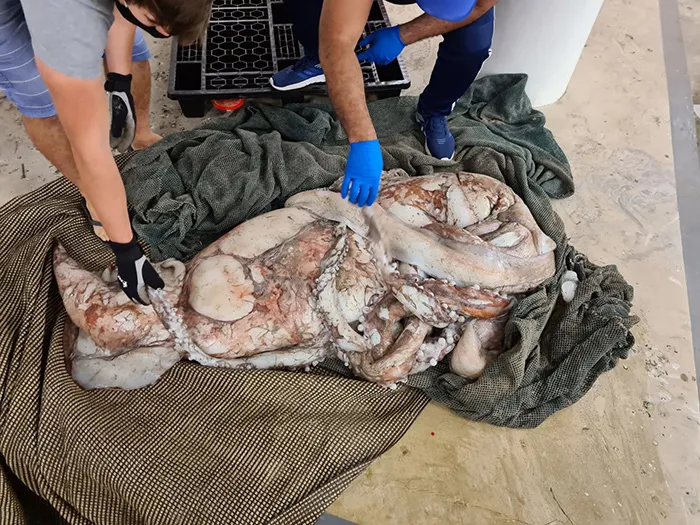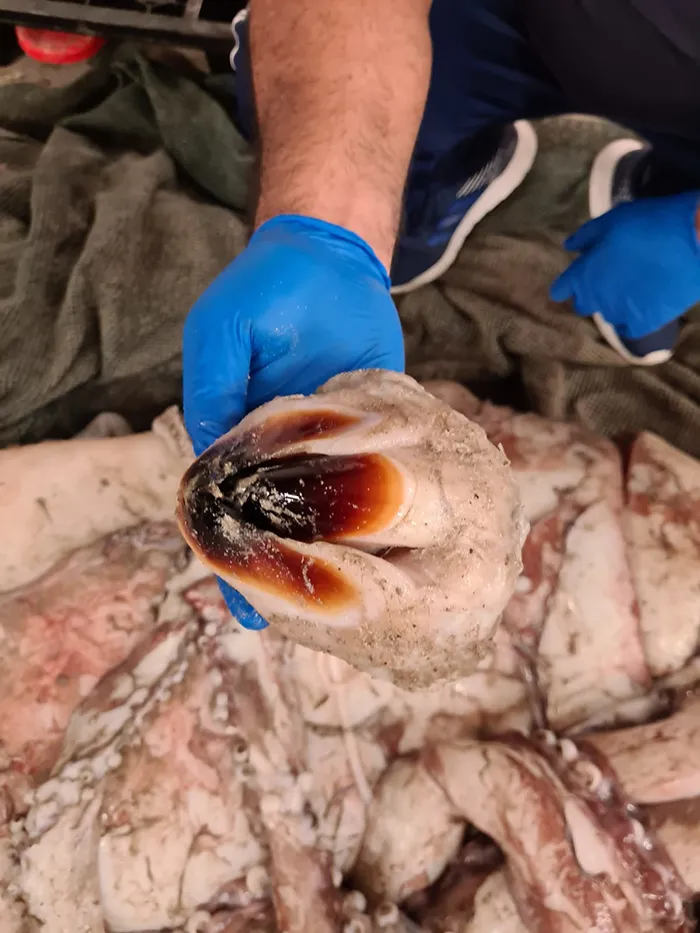Rare Giant Squid Washes Onto Shores of South African Beach
At more than 13 feet long, the creature was probably just 2 years old, scientists say
/https://tf-cmsv2-smithsonianmag-media.s3.amazonaws.com/filer/fe/c9/fec9cd4d-32b2-415b-9700-055dc262afcf/giant_squid_washed_ashore_south_african_beach.jpg)
A rare giant squid washed ashore on a South African beach earlier this month, reports Amy Gibbings for News24. The 13.7-foot-long, deep-sea dweller was stranded on a beach along Britannia Bay in southwest South Africa. Beachgoers discovered the creature and alerted officials on the morning of June 7.
Richard Davies, one of the people who captured footage of the stranded squid, says that the creature was still alive when he came across it. “It was sad because I could see it was dying,” Davies tells News24. “It was still pumping out ink and I touched one of its tentacles which sucked onto my hand and I actually had to use some force to remove it.”
Adéle Grosse of Cape Town happened upon the squid during an early morning walk with her husband, she tells Laura Geggel of Live Science. She says that her first impulse was to try to move it back into the ocean, but she quickly realized it was dead. “Oh my word, seeing it at first really took my breath away,” she tells Geggel. “Honestly, it looked like a majestic prehistoric animal.”
Scientists don’t know yet how the squid died, reports Geggel. The specimen was removed and transported to Cape Town, where it will become part of the Iziko Museums of South Africa’s permanent marine biology collection, the museum announced in a statement. During the COVID-19 lockdown, the squid is being temporarily preserved in a walk-in freezer facility before it can be moved to a more permanent location.
The find is “rare,” Wayne Florence, curator of marine invertebrates for the Iziko Museums of South Africa, tells News24. “In South Africa, we have had less than a handful of strandings. Surprisingly, despite our museum being almost 200 years old, our earliest stranded giant squid specimen is from 1972.”
This newest addition is the twentieth giant squid specimen in the museum’s collections, per the statement. Giant squids have made a name for themselves in popular culture: Think of Captain Nemo fending off the tentacled monsters in Jules Verne’s Twenty Thousand Leagues Under the Sea or medieval Norwegian legends of a Kraken lurking in the ocean’s depths. But in real life, giant squids (Architeuthis dux) have proven incredibly elusive. The enormous eight-armed creatures live and hunt mostly in the deep ocean, thousands of feet below the surface.
According to the Smithsonian Institution’s National Museum of Natural History (NMNH), a giant squid was first filmed in its deep-sea habitat just eight years ago in 2012. Researchers captured the first footage of a giant squid in American waters just last June, reported Brigit Katz for Smithsonian magazine at the time.
The latest acquisition of @Iziko_Museums is this Giant Squid (Architeuthis) specimen that washed up in Brittania Bay along the South African West Coast. Thanks to the swift action of the public, @environmentza and the South African National Stranding Network. #GiantSquid pic.twitter.com/RzU0aFgPOL
— Wayne Florence (@Dr_Flo_MB) June 9, 2020
Giant squids have eight arms and two longer tentacles that help it capture prey. They use their powerful beaks to break down food into manageable chunks, which then slide through its esophagus. The creature’s unique brain is shaped like a donut, with the esophagus running through its center—so grinding up food into small bites is “an evolutionary priority,” per the NMNH.
Michael Vecchione, an invertebrate zoologist at the NMNH, commends the Iziko Museum researchers for planning to study the squid’s DNA. “One long-standing question is how many species of giant squids there are,” he tells Live Science. One 2013 study found that all giant squids belong to the same species, reports Geggel.
Adult giant squids can grow as long as a school bus and have eyes that measure one foot in diameter—the largest eyes in the animal kingdom, per the NMNH. At nearly 14 feet long, this recently discovered specimen from South Africa was still quite young.
“Unlike most large animals, squid generally grow very quickly and only live for about five years. They have annual rings but these have to be dissected and also analysis of the beak can give an indication of age,” Florence tells News24.
“Since this giant squid is just over four meters [more than 13 feet] in total length, based on expert opinion of other larger specimens, this beast was probably less than two years old,” says Florence.
/https://tf-cmsv2-smithsonianmag-media.s3.amazonaws.com/accounts/headshot/nora.png)


/https://tf-cmsv2-smithsonianmag-media.s3.amazonaws.com/accounts/headshot/nora.png)